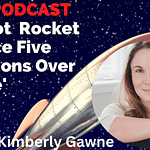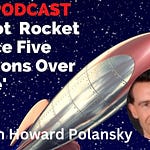Who is Julie?
Julie runs an accounting company helping businesses grow through acquisition with confidence, credibility and calculated risk
Key Takeaways
What do you find that businesses do without professional help? 1:50
The value of having a CFO 3:27
The types of clients they work with. 4:45
How to turn a business into a saleable asset. 6:13
The different areas of finance they help. 7:18
What books and courses do you recommend? 8:30
How do you know when you need more financial support? 10:04
Understanding the information you’ve been given. 11:32
Valuable Free Resource or Action
www.wilkinsonaccountingsolutions.co.uk
A video version of this podcast is available on YouTube :
https://youtube.com/live/1NjGvqu53Xs?feature=share
_________________________________________________________________________________________________
Subscribe to our newsletter and get details of when we are doing these interviews live at https://TCA.fyi/newsletter
Find out more about being a guest at : link.thecompleteapproach.co.uk/beaguest
Subscribe to the podcast at https://link.thecompleteapproach.co.uk/podcast
Help us get this podcast in front of as many people as possible. Leave a nice five-star review at apple podcasts : https://link.thecompleteapproach.co.uk/apple-podcasts and on YouTube : https://link.thecompleteapproach.co.uk/Itsnotrocketscienceatyt!
Here's how you can bring your business to THE next level:
If you are a business owner currently turning over £/$10K - £/$50K per month and want to grow to £/$100K - £/$500k per month download my free resource on everything you need to grow your business on a single page : https://scientificvaluebuildingmachine.com/svbm_1_page
It's a detailed breakdown of how you can grow your business to 7-figures in a smart and sustainable way
————————————————————————————————————————————-
Transcript
Note, this was transcribed using a transcription software and may not reflect the exact words used in the podcast)
SUMMARY KEYWORDS
business, julie, acquisition, cfo, own internal processes, question, grow, people, forecast, control, finance, exit, build, strategy, business owners, financial support, book, tca, buyer, growth
SPEAKERS
Stuart Webb, Julie Wilkinson
Stuart Webb 00:18
Hi, and welcome back to it's not rocket science, five questions over coffee. I'm delighted to be here today with Julie, Julie Wilkinson. Julie runs an accounting firm, we'll get into that in a little bit. And she helps businesses to grow through growth through acquisition with confidence, credibility, and calculated risk or shoving. It's fantastic. I'm really looking forward to hearing about that, particularly the calculated risks, Julie, so Well, welcome to It's not rocket science, five questions over coffee.
Julie Wilkinson 00:48
Thank you. Thanks for having me.
Stuart Webb 00:50
No problem. So let's start with the sort of, you know, those customers who you are trying to help, particularly those who are looking to grow by acquisition.
Julie Wilkinson 01:00
Yes, so we have a accounting and consultancy firm. There are three types of clients that we helped mainly. So we have, a lot of people we work with are in the end, potentially looking to exit. So they're looking at what they want the business to be worth, when they exit the business. The acquisitions come into play often, because they have a growth span, that's not really viable just to go in organically. So the acquisitions is a route to help people expand quicker so that they can meet their exit strategies on the timeframe that they want. So we help people plan their financial strategy, longer term, and then help them look at acquisitions and also then work with them to do the due diligence when they buy those businesses.
Stuart Webb 01:43
difficult job actually, sometimes the that that's that span of trying to sort of grow quickly, isn't it? What do you find that businesses have done without professional help like you to try and do that? And, you know, sometimes I know, because I get involved in some of it, is the difficulties they end up getting themselves into?
Julie Wilkinson 02:04
Yeah, so I think not bringing on in a finance support or in a form in the business. And I think that's often because people don't know is out there, I suppose. So what what I tend to find, when businesses are getting into a sort about half a million stage, you know, they are starting to get to the place where they could potentially, you know, have an FD or a CFO. Now that might be part time. But I still think people often get to that age and a bit worried about spending money. So they creep, and then people creep quickly, and then it gets a bit out of control. Because what so sometimes owners are quite some people are good at financial analysis, and some people aren't. And people, some people are more savvy with business and others. But even if you have got the time, we find that when and you're quite good at it, you get to a size when you don't have the time to actually do it anymore. So you end up just not doing it, but you haven't bought anyone in to do it for you. And that's where people I think, fall short of the financial analysis, because they either don't do it at all they've tried to do but they just don't have time.
Stuart Webb 03:04
Yeah, yeah. And interesting. I was having a conversation with, with somebody this morning, who was in a position where they were wanting to rapidly accelerate, but they you know, you start asking questions about cash flow forecasts, and where are they at the run rate, and they there is a blank look, and you go, Okay, I think one of the problems might be that you haven't yet really grasped what your financials are. And they really need the sort of help of somebody to sort of, you know, sit them down and explain how they do that sort of thing. And then to get well, perhaps you need somebody one day a week to just come in and hold your hand through this. Because otherwise, you're right, you know, 18 months down the road, it's become extremely complicated. And they fail to grasp some of those cashflow forecasts or run rates and things like that, which actually make it very difficult for them to grow any further.
Julie Wilkinson 03:53
Yeah, yeah, definitely. And I think, you know, I think comms bit overwhelming for people sometimes because they've got so much to think about. But at the end of the day, if you want to grow, you've got to put some more like a CFO or someone out will help something will take a lot of the work off of them. But they are going to have to be open that they need some time to actually grasp and possibly strategy thoughts. If people can't do this type of growth without putting days aside to actually deal with the growth and there's no point in trying to do the process. Even we can build the best reports in the world if you never have any time to take it in. And it's not. It's a bit of a pointless exercise. Anyway.
Stuart Webb 04:26
Brilliant. Brilliant. Julie, what help do you help with doing this initially, with some some of the funds you come across? I guess you don't immediately just launch in and say, right, it's 2000 pounds a day for me to even start engaging with you. What's the sort of route into getting help?
Julie Wilkinson 04:45
So it does kind of depend where they are and who they are. So the two main types of clients is either we just get buyers coming to us who are just looking to grow by acquisition. Now they could have businesses or it could be like a sideline business. So if it's, if you're at an acquisition stage, we come in In sort of when they found the businesses because we're not brokers, so we don't help people find businesses. So they're either a buyer, obviously a buyer can be a business. But if it's like an independent buyers would come in. But then on the generic business, if they're looking to grow, yeah, like you said, they're probably probably have like what we call a discovery session, which is basically a deep dive where we go in and sort of assessment businesses. Because we find people that want to grow by acquisition, if they haven't got their own internal processes sorted, it can make it worse, basically, because they're bringing in more complex scenarios into their business, and they don't even measure their own business, let alone another one. So we would sort of assess it to say, Well, what do we think they're ready into, like how we would get them on that journey to be ready to do the acquisition, the exit strategy is a whole nother conversation, because obviously, that's more about them building their own internal processes, so that the business is more of an asset than, than just sort of like lifestyle. But it all encompasses really into the same sort of journey, because the acquisition is just an option within that growth journey. You can still wet sit and grow without an acquisition. But you still need to set set things in place to actually be able to exit to maximise value at the end
Stuart Webb 06:13
of it, absolutely love it, the fact that you're talking about that? Yeah, once again, that's really the sort of thing that that we deal with here, which is actually helping people to understand that, you know, you can't exit a business if you're still at the centre of it. And if it's still you, and everything you do, that's no longer an asset. That's, that's that's you. And to turn that business into something which is potentially saleable, only say, potentially, because too many times, I find business owners who will turn around and go, Well, I don't I want to, I don't want to leave that much control in other people's hands. The answer is, well, you don't want to leave your business then do so you might as well accept it. But you know, in order to be able to sort of get to the point where you can leave the business, you have to have processes, systems, checklists, database, all the rest of things, which are in other people's control that you can say, Well, so long as they're doing everything that I need them to do, then I can actually walk away and leave the business in good hands. And that's when it becomes a saleable asset. Until then, it's just as you said, it may be a very large lifestyle business, but it's still at the heart. It's still a lifestyle business.
Julie Wilkinson 07:18
Yeah. And if you broke down the different areas of finance that we helped with, we would help in different areas. So we have different levels of staff. So we have bookkeepers. So they would sort of help businesses deal with day to day, bookkeeping, keeping on top of their reconciliations and making sure the integrity is in order. Then we saw got our CFOs, which we have, which would help with the strategy. So someone said to us, well, I want to exit in five years, we would say, Well, before we do anything, let's build the forecast initially, just to see like, if you carried on as you were, where would you be, like the value and then looking at like, what are the opportunities or the milestones they have to get to get there. And then you would have sort of the governance and controls piece around the organisation. So that would be more likely who's doing what and where to control. So the example I generally use to people, if they wanted to pay a supplier, they own the still paying suppliers and they want someone else to pay the supplier, would they have an end to end order to payment control process, so they could feel comfortable that someone would do that and it wouldn't go wrong. And so so as safe as we can do like governance and control. So we can help look at the organisational structure and how those controls will help minimise, like risk of error and fraud.
Stuart Webb 08:28
Brilliant. Julie, what is there? Is there a particular book or programme or course that that you sort of you learned your craft through and you'd recommend other people to sort of get hold off and start thinking?
Julie Wilkinson 08:42
Well, I so I'm a chartered management accountant by trade. I mean, I've been taught for over 10 years, I've worked in sort of finance in different areas, clients for over 20 years. So I don't, there isn't? Yeah, obviously there's courses and books that can give you knowledge. But I just think this type of thing comes with experience. And so I don't the I don't believe there's any court or book that can help them magically do all this themselves overnight. I think obviously there's courses that can give people knowledge, some guidance, I I just think the best thing to do is get the right help from the right people, because obviously we would be expected. So when we when we come to look organisational structure of a business, you know, the first thing would be saying to people they want to exercise Have you got a management team? Now that management team would probably include one of our CFO, they wouldn't only be the CFO and be de our sales director, do you have a managing director or UPS director maybe you know, and if they don't have those people, this person would be sort of thinking as well you need to stop and go and get them on the team. So but obviously you know there are I don't particularly read that much Ralph. I do listen to some podcasts and stuff, but I don't think there's anything I don't feel that one course or book that could give the overall knowledge of finance because it's too detailed. And that's why people study for years to learn. Ah, I get the experience from it.
Stuart Webb 10:02
course there are some excellent podcasts out there. And I'm not going to mention any one in particular. But if you're not listening to this one, you've clearly done something seriously wrong in your life anyway, moving on, Julie, there must be one question that I'm currently sort of poised to ask you, and it must be sort of on the tip of your tongue. I wish he'd asked me the following question. So I'm going to ask you to specify what is the fifth question I should ask you? And then once you've answered the question, what is that question? You should answer it for us?
Julie Wilkinson 10:32
Yeah, so the question, well, I'm sort of taught, I'm doing this question to help business owners really, I just think business owners need to sit? The question I'd be asking is, as a business owner, how do I know I need more financial support? That's what's what I think the business owners should be asking themselves, because it's difficult to know what their account is. And I think, you know, my answer to that would be if you don't have a forecast, and I don't mean what in your head or written down on the whiteboard, I mean, sort of like a five year plan with a bit of a cash flow. If you don't have the actual KPIs and master documented and some form of management report that will literally report on those. And so that means everything, not just, you know, writing a few marketing things down on the whiteboard, again, you know, to help people track things, if you don't have those things in or don't regularly get information that you understand, then that's when you need more financial support, because you need those things to start making decisions.
Stuart Webb 11:31
And love your question. And it would be one thing that I would spend a lot of my time talking to customers about, actually, which is Yeah, have you actually understood the information you've been given by people? Or indeed, have you got any information? Because there are so many that when you ask about information, just have no nothing at all, which they can actually sort of point at. So I love the question. I think it's brilliant. Thank you so much. Okay, look, we've come to the end of the five questions with Julie. If you would like to get notifications about when we have an upcoming discussion, such as this one want to join in, join us live, even ask questions and make comments. go to this link, which is TCA dot FYI, forward slash subscribe, that's TCA dot FYI, forward slash, subscribe, get on the mailing list. We've had quite a number of people join in the last few days. And you'll get a notification that we've got an interview coming up, such as people like Julie, you get some interesting information. It's not it's not all sales. It's about helping you build a better business. So Julie, thank you so much for coming on. I really encourage people to get onto your website and find out about the sort of thing that you do in terms of getting people to sort of acquire and think about how to acquire sensibly and with sensible strategies. Thank you.
Julie Wilkinson 12:54
Thank You.














Share this post